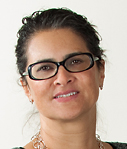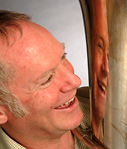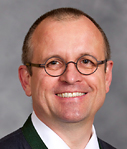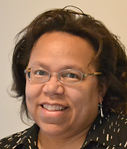Six faculty members have been honored for outstanding contributions to undergraduate education as this year’s recipients of Arthur F. Thurnau professorships.
Those honored include a leader in linguistics curriculum development, a creator of experiential learning projects tied to community involvement, and a professor whose charismatic teaching is described as “sheer magic.” Also selected are a pioneer in promoting civic engagement through art education, a professor training engineering students to combine technical expertise with global competence, and a psychology professor who in one popular course encourages students to relate theories to their own lives.
This year’s recipients are Samuel D. Epstein, Martha S. Jones, Fritz A. Kaenzig, Janie C. Paul, Volker Sick and L. Monique Ward. Descriptions of their work are taken from recommendations provided to the regents by Provost Phil Hanlon. The appointments, approved Feb. 21 by the Board of Regents, are titles the six will retain throughout their careers at the university.






Epstein
Jones
Kaenzig
Paul
Sick
Ward
Epstein, professor of linguistics, LSA, is an international leader in the study of generative syntax. His love for his subject and classroom performance create an interactive environment characterized by humor, respect, and lively participation, transforming large lectures into intimate intellectual exchanges. He encourages students to think critically about linguistic concepts. One student described him as “that one unforgettable teacher to whom one compares all other instructors.” His honors theses advisees have received awards, presented at national conferences, and published in peer-reviewed journals. He has inspired students to pursue graduate work, and he is known for providing “the voice of students” on policy and curriculum changes. He was a leader in developing the Language and Mind subconcentration and the interdisciplinary cognitive science major.
Jones, associate professor of history and associate chair of the Department of Afroamerican and African Studies, LSA, is called by colleagues an innovative, collaborative and visionary teacher whose interdisciplinary research infuses her teaching. One colleague says her teaching “represents the very best of Michigan’s concern for undergraduate learning, for civic engagement, and for rigorous research.” Jones combines a caring, student-centered approach with insistence that students have a responsibility to plunge into primary sources and argue for their interpretation. Pushing beyond conventional classroom boundaries, she creates experiential learning projects that connect primary research with community involvement. Her public exhibits, such as the recent “Proclaiming Emancipation” project at the Hatcher Library, provide experiences where students discover how vivid the past can be.
Kaenzig, professor of music, School of Music, Theatre & Dance, maintains the highest standards of teaching while inspiring colleagues and students. Recipient of the 1999 Harold Haugh Award for excellence in studio teaching, his tuba/euphonium studio is acknowledged as the finest in the country. Many of his former students play in top orchestras or serve as professors at major schools of music. In the classroom, Kaenzig fosters a culture of responsibility, accountability, camaraderie, respectful competition, and mutual support. Students describe his charismatic teaching as “sheer magic” and a “rejuvenating balance of substance and inspiration.” His cultivation of diversity is evident in the success of a student who became the first woman ever to hold a principal tuba chair in a major American orchestra, the Philadelphia Orchestra.
Paul, professor of art, Penny W. Stamps School of Art & Design, and professor of social work, School of Social Work, has been a pioneer in the promotion of civic engagement through art education. She is dedicated to students’ intellectual, creative, and personal development and believes all deserve the tools and skills needed for positive, productive self-expression. Paul promotes reciprocal learning in which students grow by working with others. Her courses and programs serve as national models for best practice in university-community partnerships. This is demonstrated through her work with the Prison Creative Arts Project in which students facilitate art workshops for inmates. Colleagues say her commitment to diversity has brought about a seismic shift in how artists define themselves and their mission as educators.
Sick, associate vice president for research, natural sciences, and engineering, Office of the Vice President for Research, and professor of mechanical engineering, College of Engineering (CoE), has incorporated international perspectives into the experiences of CoE undergraduates. As faculty adviser to U-M’s top ranked Formula SAE racing team, he has mentored several generations of students, advocating for improved work space, additional funding and course credit. His commitment to diversity is evident in his promotion of international programs; support for underrepresented, transfer and international students; and the use of cross-cultural lab groups. Sick co-created the minor in international engineering, the first of its kind in the country and currently the most popular minor in the college. Through his groundbreaking Engineering Across Cultures seminar, students are trained to combine technical expertise with global competence.
Ward, professor of psychology, LSA, a leading scholar in the field of adolescent media socialization, was a winner of the 2011 John Dewey Award, for long-term commitment to undergraduate education. In her Introduction to Human Development course, she encourages students to relate theories to their own lives, turning a large lecture course into a personal experience and one of the most popular courses in the department. In a seminar on children and the media, she draws on psychological theory, enabling students to explore sensitive issues such as body image, racial perceptions, and sexual attitudes. Ward has mentored independent research for more than 100 undergraduates, many of whom have won awards, presented at conferences, and published their research. A colleague says that “single-handedly, Dr. Ward has trained a multi-ethnic and multiracial cohort of scholars who will take their place among the ranks of developmental psychologists across the country.”
Each year Thurnau Professorships recognize and reward a select group of tenured faculty members for their outstanding contributions to undergraduate education. Criteria for the award include a strong commitment to students and to teaching and learning, excellence in teaching, innovation in teaching and learning, a strong commitment to working effectively with a diverse student body, and a demonstrable impact on students’ intellectual or artistic development.
The professorships are named after alumnus Arthur F. Thurnau and supported by the Thurnau Charitable Trust, which was established through his will. Recipients receive $20,000 to support teaching activities, including travel, books, equipment and graduate student support.

